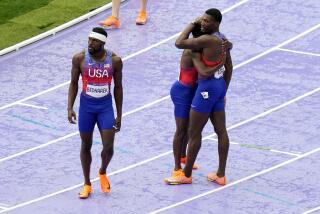With 26 medals, U.S. track team approaches goal
- Share via
LONDON — Doug Logan’s legacy from a brief and controversial two-year tenure as chief executive of USA Track and Field is a number.
Thirty.
It is the number attached to a project designed with the goal of winning 30 medals at the 2012 Olympics. Only one U.S. Olympic track team has reached that total in a nonboycotted Olympics since 1956, and it is seven more medals than Team USA won four years ago.
PHOTOS: London Olympics, Day 14
Logan was ousted near the end of 2010. Project 30 ended. The idea of winning 30 medals remained.
And the U.S. still has a chance to get there, almost in spite of itself.
A world-record triumph in the women’s 400-meter relay and a silver in the men’s 1,600 relay Friday left the U.S. with 26 medals, its biggest haul since 30 at Barcelona in 1992. The athletes winning those medals keep coming from a seemingly haphazard talent production system that basically has nothing to do with the U.S. federation.
“We’re like the fountain of youth when it comes to talent,” said three-time Olympic 400 runner DeeDee Trotter. “We keep dipping in and coming up with great stuff. Our universities and their facilities help us. I don’t know how we do it, but we do.”
Two-time Olympian Ekaterina Kostetskaya of Russia knows. She went to high school and college in the United States.
“There is a very solid plan,” she said after finishing ninth in Friday’s 1,500. “There is a whole recruitment system to universities for people in high school championships. After that, the ones that are successful are picked up by sponsors.
“I think it’s a very structured system. We have nothing like that in Russia.”
China has the most top-down control of any current sports system in the world, 1.3 billion people and just three medals in track and field. The former East Germany had an even more structured system with just 17 million people, and it dominated women’s track and field throughout the 1980s.
Track and field may struggle as a spectator sport in the United States, but it still prospers in participation. The most recent survey by the National Federation of State High School Assns., for 2010-11, showed more high school girls are in outdoor track and field than any other sport. Only football is more popular among boys.
That provides the base that feeds colleges.
Allyson Felix is the rare U.S. Olympic athlete who did not compete for one.
On Friday, she ran the second leg of a U.S. sprint relay that broke a 27-year-old world record set by East Germans, whose country had not only a thorough talent identification system but a state-run doping system. Records from that era had looked unapproachable to Felix. This one was the second oldest for an event on the Olympic track and field program.
“To look up and see we had a world record, it was crazy,” Felix said.
Tianna Madison, Felix, Bianca Knight and Carmelita Jeter clocked 40.82, more than a half-second faster than the East German mark of 41.37. In a sport where all such achievements engender suspicion, the U.S. performance undoubtedly will attract raised eyebrows.
It seems equally noteworthy that four women ages 32 (Jeter) to 23 (Knight) came together in a sport where few U.S. track athletes make enough money to live on.
“We know we’re competing in a dying sport,” Lashinda Demus, the 400 hurdles silver medalist, said this year. “People are making $15,000 a year and calling themselves a professional athlete.”
What money can do is evident in the success of U.S. men’s distance runners at this Olympics, with two silver medals, a fourth place, a sixth and an eighth. Nike has made a large investment in Oregon-based distance-running groups that produced 10,000-meter silver medalist Galen Rupp and sixth-place steeplechase finisher Evan Jager. Before Rupp, no U.S. man had won a track medal in a race over 1,500 meters since 1964.
Four years ago, the U.S. did not win a single medal in the four horizontal jumps, a traditional area of strength. The long and triple jumpers won five this time, including two golds.
Jamaica swept the sprint golds in 2008. Felix prevented that in 2012 by winning the 200, and Jamaica was a distant runner-up in the sprint relay despite a national-record 41.41, the third fastest in history.
The men’s 1,600 relay team hung in against the Bahamas with a patched-together team because of injuries to the last two Olympic 400 winners, LaShawn Merritt and Jeremy Wariner. In the Thursday heats, Manteo Mitchell completed the leadoff leg despite breaking his left fibula halfway through it. He watched the final on crutches.
“We have a lot of depth and a lot of talent,” Williams said. “We probably could have got a discus thrower out there to run 44-something.”
Not since the 1996 Atlanta Olympics has the United States so dominated an Olympic track competition. Its eight gold medals are double anyone else’s, and the total medal count is 16 ahead of Russia and Jamaica, tied for second at 10.
“It’s kind of like the planets aligning,” said U.S. sprinter Justin Gatlin, 2004 Olympic champion and 2012 bronze medalist in the 100.
There is no better explanation.
twitter.com/olyphilMore to Read
Go beyond the scoreboard
Get the latest on L.A.'s teams in the daily Sports Report newsletter.
You may occasionally receive promotional content from the Los Angeles Times.










